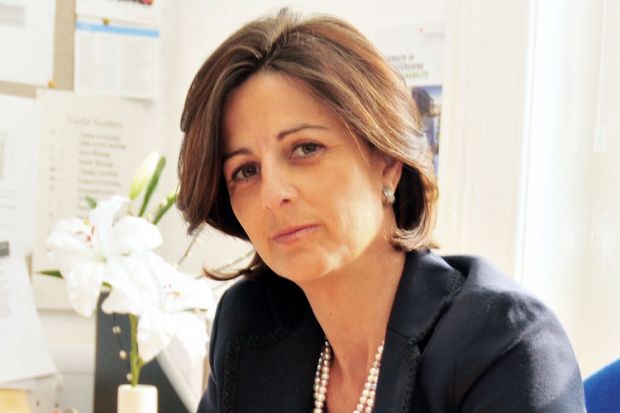Daniella Tilbury is dean of sustainability at the University of Gloucestershire. With more than 25 years’ experience in the sector, she has held academic positions throughout the world, including stints at the universities of Cambridge and Hong Kong. In August she will take the reins of the newly created University of Gibraltar.
Where and when were you born?
I was born in Gibraltar in the mid-1960s, a week prior to a sovereignty referendum where 99.6 per cent of Gibraltarians democratically expressed their wish to remain British.
How has this shaped you?
General Franco’s response was to close the border between Spain and Gibraltar. This had a tremendous economic and social impact on the small peninsula I call home. Spain’s claim to the Rock is based solely on its proximity to the Spanish mainland and that has about as much relevance as a claim to Portugal or France. Given this context, it is not surprising that I am passionate about human rights, international policy and sustainable development.
How did you react to being made vice-chancellor?
I was honoured and humbled. As a Gibraltarian, I am excited by the multiple benefits the university will bring to our community.
You were the first female Gibraltarian to hold the title of university professor and now you will lead the first Gibraltarian university. How does that feel?
It is an indicator that times are changing. Women can aspire to the same positions and levels of responsibility as men. But the pathways to career progression are still not as equitable as they could be.
What is the significance of creating a university in Gibraltar?
Starting with a blank canvas has allowed us to create a university that can respond to global issues as well as regional priorities. We are not held back by outmoded traditions or bureaucratic structures, and thus have been able to respond quickly to new opportunities, convene cutting-edge thinking and attract talent.
What about international students?
Our aspiration is to host a strong, vibrant international student population by 2018. We believe our Mediterranean location, bilingual environment and quality programmes will be attractive to students beyond our shores.
You’ve held positions in institutions all over the world. Which country’s academy is leading the others and why?
The Australian sector has a very positive outlook regarding community engagement and environmental responsibility. However, the UK is notable for its deliberate and consistent approach to quality assurance and enhancement. Its higher education agencies play a critical role in regulating and/or improving academic standards as well as the broader student experience. When you have worked in countries where such bodies do not exist, you realise their significant and positive influence.
As a child, what did you want to do when you grew up?
I was always passionate about education. I recall sitting at the back of a classroom reflecting upon the teaching and learning dynamics, observing teaching tactics more than learning whatever was being taught at the time!
What advice would you give to your younger self?
Have confidence and learn from difficult or unexpected situations.
What kind of undergraduate were you?
I was a curious undergraduate who loved learning but did not enjoy taking exams.
What do you do for fun?
Host family meals. I enjoy gathering the family together around food, preferably outdoors.
If you were a prospective student facing £9,000 fees, would you go again or get a job?
Higher education can be a life-changing experience. The learning it provides cannot be gained “on the job” or be self-taught. I will be encouraging my daughter to consider going to university and to make careful choices.
Has the university got a crest and a motto yet?
The motto of the University of Gibraltar is Scientia est Clavis ad Successum, which means “knowledge is the key to success”. The use of the metaphorical Clavis echoes the historical interpretation of Gibraltar as the key to the Mediterranean – as symbolised by the key that hangs from the castle in Gibraltar’s flag. The castle and key are also depicted in the university’s coat of arms.
后记
Article originally published as: HE & me (18 June 2015)
